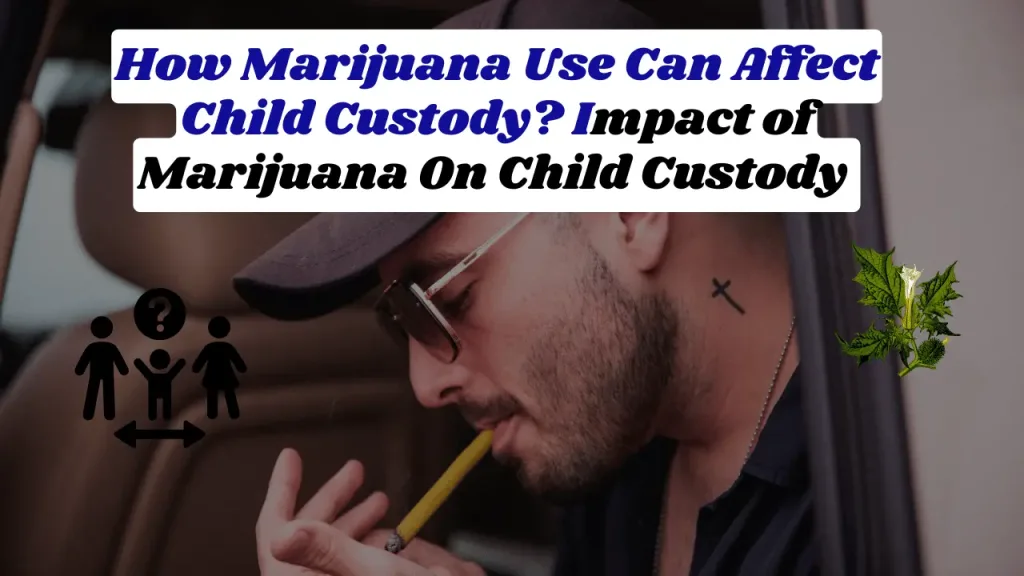Can Smoking Weed Make You Lose Custody Of Your Child? Impact of Marijuana
Substance use, particularly the use of marijuana, has become a central issue in family law cases as states continue to adjust their legal frameworks. For parents facing custody battles, understanding how substance use can impact custody decisions is crucial. This comprehensive guide will explore the latest developments, expert insights, and statistics to help navigate custody disputes involving marijuana and other substances.
How Courts Are Handling Marijuana and Substance Use in Custody Cases
Marijuana Legalization and Custody Cases: State and Federal Perspectives
The legalization of marijuana has created a complex legal landscape in the U.S., with each state having its own regulations. For example:
- In New York, the Marijuana Regulation and Taxation Act of 2021 legalized recreational use. Yet, despite state-level legality, marijuana is still federally classified as a Schedule I drug—meaning it’s deemed to have no medical use and a high potential for abuse. This federal classification affects family court rulings because federal law can still influence a judge’s decision, especially in cases involving interstate custody disputes.
- In Texas, marijuana remains illegal, and even use outside the state can influence custody cases. Family law courts, particularly in conservative areas like Denton and Collin Counties, often treat marijuana use as a significant concern, even when a parent has a legal prescription from another state.
Despite changes in the law, the stigma around marijuana remains a factor in custody decisions, especially in courts that are slower to adopt societal shifts.

Table of Contents
Expert Insight: What Family Law Attorneys Are Saying
Family law attorneys have noticed a few emerging trends in how courts handle marijuana use:
- Greater Scrutiny on Marijuana Use Compared to Alcohol: Many courts still view marijuana more negatively than alcohol, often due to historical biases and the substance’s Schedule I classification. Even where legal, marijuana is frequently held to a higher standard, and any indication that use impairs a parent’s judgment or capacity to care for a child can impact custody.
- Increased Concerns About Child Exposure: Accidental ingestion of marijuana edibles by children has risen, with the Upstate New York Poison Center noting an increase in cases from 7 in 2019 to 64 in 2022 for children under five. This issue can be a focal point in custody disputes, especially if one parent believes the other’s marijuana use poses a direct risk to the child.
Statistics on Substance Use and Child Welfare
- 1 in 8 children in the United States lives with at least one parent who has a Substance Use Disorder (SUD), according to the National Center on Substance Abuse and Child Welfare.
- In 2019, approximately 38.9% of children removed from their homes were due to substance-related concerns, highlighting the significance of substance abuse in child custody and welfare cases.
- Substance use, including marijuana, is a factor in nearly 1 in 3 custody cases, with a focus on whether it impairs parenting abilities.
The Role of Substance Abuse in Custody Determinations
Defining Substance Abuse in a Legal Context
The legal system typically defines substance abuse as a pattern of drug or alcohol use that results in at least one of the following:
- Inability to fulfill major responsibilities at home, work, or school.
- Legal problems stemming from substance use, such as DUI convictions.
- Physical danger to oneself or others, including driving while intoxicated.
- Ongoing social and interpersonal issues that arise or worsen due to substance use.
How DUI Convictions Affect Custody
A DUI conviction can influence custody decisions, depending on factors like:
- The severity of the offense: A single DUI might not automatically result in custody loss, but multiple incidents indicate a pattern of risky behavior.
- Circumstances: Was the child in the vehicle? What was the parent’s Blood Alcohol Concentration (BAC) at the time of the offense?
- Ongoing Behavior: Courts may require proof of rehabilitation and regular drug or alcohol tests before granting custody or increasing visitation rights.
Related Articles For You:
Substantial Change in Circumstances for Custody and Support Modifications in California
What to Do If a Mother Takes a Child Without a Custody Agreement

Practical Advice for Parents Facing Custody Disputes Involving Substance Use
- Demonstrate Responsible Behavior: Abstain from drug and alcohol use, especially during a custody dispute. Courts look favorably on parents who can show they are not using substances during this sensitive period.
- Secure Storage: For parents who use marijuana—whether medically or recreationally—it’s crucial to store it securely, away from children. Use child-proof containers, consider a medication lock box, and keep edibles clearly labeled to avoid accidental ingestion.
- Get Legal Help: Engaging a family law attorney with experience in cases involving substance use can provide tailored guidance. They can help with documenting sobriety, securing substance abuse evaluations, and ensuring that the court understands the context of your case.
Family Treatment Courts: A Collaborative Approach to Custody and Recovery
Many states have established Family Treatment Courts (FTCs), also known as family drug courts, which use a collaborative approach to help parents recover from substance use while maintaining or regaining custody. The goals of these courts include:
- Supporting long-term recovery through regular check-ins and mandatory treatment programs.
- Reunification of families: If a parent completes the program successfully and maintains sobriety, the court may increase visitation rights or grant custody.
- Promoting child welfare by closely monitoring the parent’s progress and ensuring a safe home environment.
Expert Recommendations for Parents in Custody Battles Involving Substance Use
- Undergo a Substance Abuse Evaluation: If substance use is a concern, voluntarily seeking a professional evaluation can demonstrate responsibility and commitment to change.
- Participate in Court-Approved Treatment Programs: Engaging in therapy, counseling, or rehabilitation programs recognized by the court can show a commitment to recovery.
- Gather Documentation: Keep records of treatment, drug tests, and any measures taken to address substance use. These documents can serve as evidence in court to prove sobriety and a safe environment for the child.
Conclusion
The intersection of substance use and child custody is complex, and the legal landscape continues to evolve. Judges have significant discretion, influenced by state laws, federal guidelines, and the specific facts of each case. Parents facing custody battles should be proactive, informed, and strategic in their approach to ensure that their child’s best interests are central to any decision. Consulting with a family law attorney can be crucial in navigating these sensitive matters, especially in cases involving substance use.
Helpful Resources
- National Center on Substance Abuse and Child Welfare
- American Addiction Centers
- Child Protective Services – General Information
FAQs
Can Marijuana Use Affect My Custody Case?
Yes, marijuana use can significantly impact a custody case, even in states where it’s legal. Courts prioritize the child’s best interests, which often means assessing if substance use impacts a parent’s ability to provide a safe and stable home environment. Occasional use may not be a dealbreaker, but if it affects a parent’s caregiving, the court could order supervised visitation or reduce custody rights.
Can You Lose Custody Due to Drug Use?
Yes, substance abuse can result in losing custody if the court determines that it hinders a parent’s ability to meet their child’s needs. A parent who has a history of substance use may face additional scrutiny, and any behavior suggesting that drug use has compromised the child’s welfare—such as neglect or impaired driving—can lead to custody loss.
Can Medical Marijuana Use Be a Factor in Custody Cases?
Even with the legalization of medical marijuana, courts always remain cautious. Possessing a medical marijuana card doesn’t guarantee acceptance from the court, and judges may still view its use as being “under the influence,” particularly if it interferes with daily caregiving responsibilities.
Related Articles For You:
Can Your Child Get Taken Away If You Smoke Weed UK?
About the Author

Sarah Klein, JD, is a former family law attorney with over a decade of courtroom and mediation experience. She has represented clients in divorce, custody cases, adoption, Alimony, and domestic violence cases across multiple U.S. jurisdictions.
At All About Lawyer, Sarah now uses her deep legal background to create easy-to-understand guides that help families navigate the legal system with clarity and confidence.
Every article is based on her real-world legal experience and reviewed to reflect current laws.
Read more about Sarah
